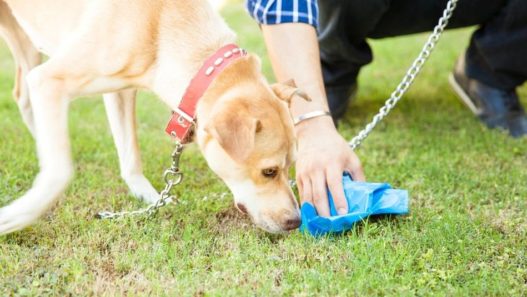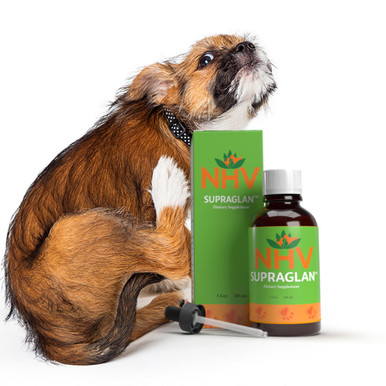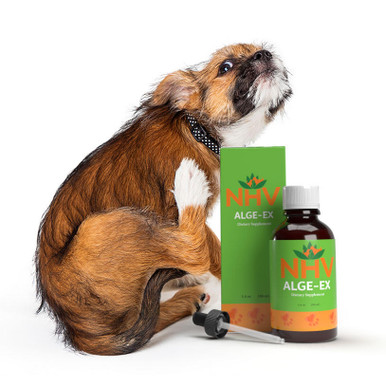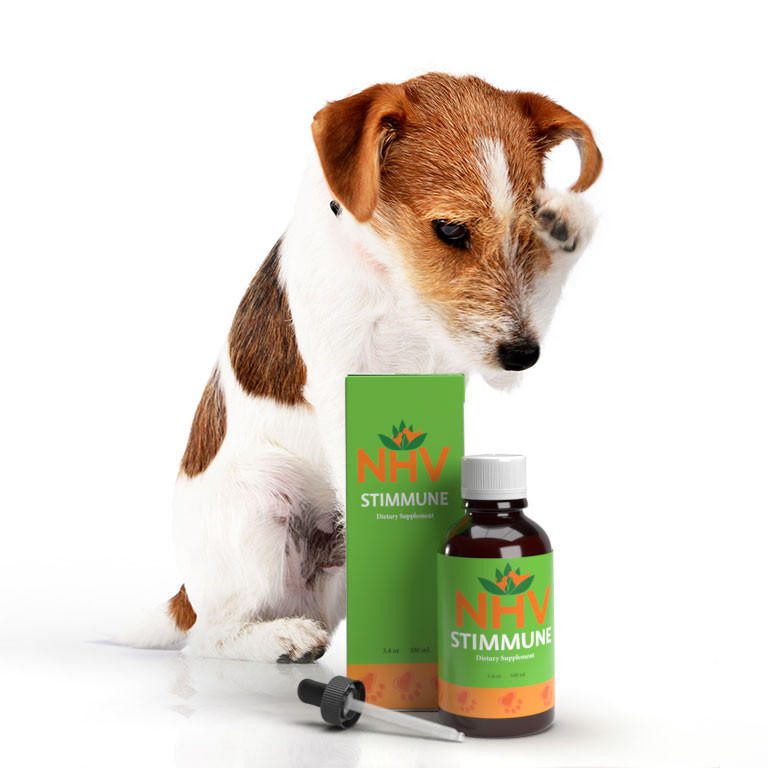
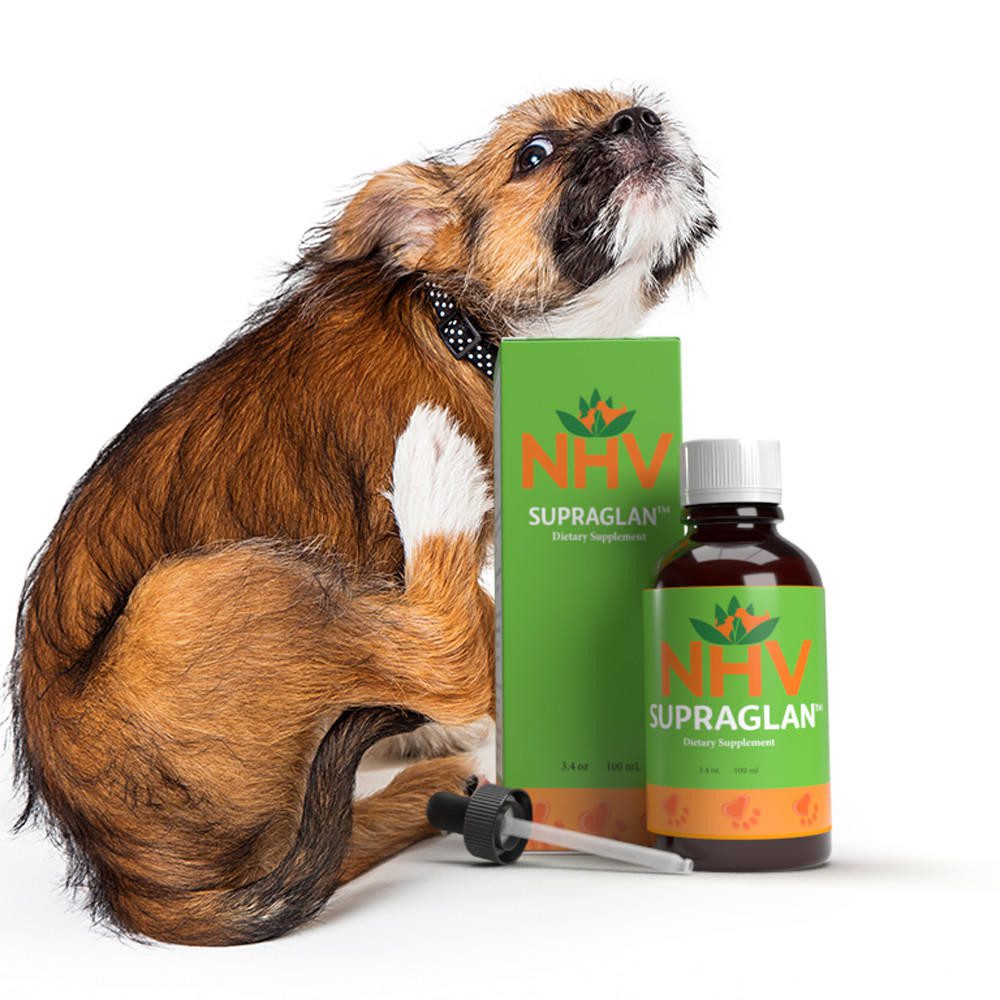

All pets can have allergic reactions that could impact their life. Whether this is triggered by their environment, flood, or fleas, pet allergies can cause discomfort and irritation to your furkiddo. Thankfully, there is holistic help for pet allergies that blends conventional treatments with natural and proactive care that offers a practical solution to your furkiddo’s well-being and a more enjoyable life.
Types of Allergies in Pets
Three main types of allergies commonly affect our furkiddos:
1. Environmental Allergies (Atopy)
These allergies are caused by substances in a pet’s everyday surroundings. Sources include pollen, dust mites, mold, animal or plant fibers, household chemicals, etc.

These allergens can be inhaled or absorbed through the skin. They can cause reactions such as skin irritation, sneezing, or watery eyes. An environmental allergy is often seen more frequently during certain times of the year, particularly during spring or fall.
The diagnosis of these kinds of allergies can be difficult because there are no available tests that can positively identify the condition. Your vet might base it according to age, breed, signs, and history. Allergy testing cannot diagnose allergies, but it can be useful to identify allergens and formulate a treatment program suitable for your furkiddo’s specific needs.
2. Flea or Insect Bite Allergies
Flea bites can cause intense allergic reactions in pets. When a flea bites the skin, there are proteins found in its saliva that can trigger itchiness and inflammation, which will turn into a potential problem with secondary bacterial infections. Fleas are often invisible to the naked eye, but you may see tiny, black specks on your pet’s skin (particularly near the base of their tails or behind their ears) similar to coffee grounds. These are known as flea dirt – flea excrement, containing digested blood.
3. Food Allergies

Food allergies in pets can develop anytime, suddenly, even from ingredients that your furkiddo has been eating for their entire lives. Main animal proteins, such as chicken, beef, dairy, and fish, are often the common cause. Food allergy symptoms vary, ranging from skin irritation to ear infections, watery eyes, respiratory distress, and gastrointestinal issues.
Food allergies are diagnosed by an elimination diet and seeing if the itching resolves. An ideal food elimination diet should be a trial based on a balanced and nutritionally complete diet, not containing any ingredients that have been previously fed to your furkiddo. These include introducing novel proteins such as duck, rabbit, or venison.
An alternative to this is a prescription diet that contains hydrolyzed proteins. These are broken down into components your furkiddo’s body no longer recognizes. Whichever diet is chosen, your fukiddo should only eat the foods and treats recommended by your vet or vet nutritionist during the duration of the trial.
Common Allergy Symtoms
Allergies often appear on the skin; however, there could also be gastrointestinal or respiratory signs to be on the lookout for:
- Excessive scratching, licking, or biting which could lead to fur loss or bald patches
- Red, inflamed, or scabby skin
- Face rubbing
- Bootie scooting or licking of their anal glands.
- Chronic ear infections or wax buildup
- Coughing, sneezing, or wheezing (these are more common in cats)
- Loose stools, vomiting, or diarrhea
- Inflammation inside the nose (rhinitis) and asthm
Natural Remedies and Proactive Support
Allergy treatments require long-term management and regular vet examinations. Some of the most common conventional treatments for pet allergies include the use of conventional medications such as antihistamines, nasal corticosteroids, immunotherapy, and specific diets, along with controlling the signs of itching, bathing, and improving coat hygiene, controlling flare factors, and avoidance of the offending allergens.
Natural remedies for pet allergies and overall holistic lifestyle changes can offer some relief from some of the symptoms. Some simple strategies that could ease symptoms include:
Paw Care

Wipe down paws and fur after outdoor activity to remove any allergens that could stick to your furkiddo’s fur. The use of paw protector booties when taking long walks could be beneficial. Sprays like NHV Target Spray could be useful to prevent any reactions to allergens, protecting against insects such as fleas and mosquitoes. If there are signs of dermatitis or skin breakage, natural ointments such as NHV All Clear Ointment can offer support for dry skin, crusty scabs, itchy skin, redness, and inflammation.
Clean Breathing
Help for pet allergies can start in the home. Use an air purifier to reduce indoor allergens. These can help trap particles and create a cleaner breathing environment for your furkiddo. Indoor allergens cause more harm if the pet spends a lot of time indoors. Supplements such as NHV Resp-Aid could offer gentle support to allergy-related respiratory problems such as sneezing and runny nose.
Ditch Artificial Chemicals and Fragrances
Switch to hypoallergenic shampoos when bathing your pet as traditional pet shampoos may contain fragrances or chemicals that can be aggressive to sensitive skin. NHV Coco Furcare is an excellent example of a gentle, herbal option that keeps their fur fresh, supports the skin, and calms itchy areas after a nice, warm bath.
Support Skin Health
Omega-3 supplements can help support healthy skin. These fatty acids, found in supplements like NHV PetOmega 3, are known to support skin health, reduce inflammation, and help support the immune system. This can make a real difference in how your furkiddo responds to allergens.
Track Changes
You could track reactions, keep a diary of flare-ups, and take note of any patterns to see what they are that day or if there were changes in their environment. These could be useful when visiting your vet and providing more information about your furkiddo’s overall health, particularly when tracking down their feed patterns.
Identifying Allergy Triggers in Pets
Once you identify a trigger, you will learn to avoid it. Even small adjustments can go a long way in preventing a flare-up and help your furkiddo feel more comfortable. Supplemental support could be a great way to ease uncomfortable symptoms. NHV Alge-Ex may help with allergies linked to acute environmental allergens by regulating the histamine response, particularly when your furkiddo has a seasonal allergy. On the other hand, if your furkiddo requires more general support with allergies, such as food or insect reactions, NHV Stimmune may offer a more suitable support and may help restore vitality and balance the immune system.

Finding the proper diet for a sensitive furkiddo can take time and patience, but the results are well worth it. If you are unsure how to start, it’s always a good idea to consult your vet or a vet nutritionist. At NHV, we offer personalized vet nutritional consultations to help you find the proper diet for your sensitive furbaby.
Help for Pet Allergies with NHV
While treating pet allergies can become a long-term commitment and be frustrating at times, a holistic approach that involves both conventional and natural treatments makes a real difference. Combining conventional care, dietary awareness, and natural remedies like NVH Natural Pet Products may help your furkiddo feel more comfortable and help them live a happier, holistic life.
Need help for pet allergies? Reach out to our Pet Experts for personalized recommendations and tips!

Stimmune
Stimmune - helps support a pets immune sytem

Stimmune - helps support a pets immune sytem
- item number
- ph1450fb
- weight
- 0.7
-
Description
- item number
- ph1450fb
- weight
- 0.7
-
Ingredients
-
Dosage
flea & tick support
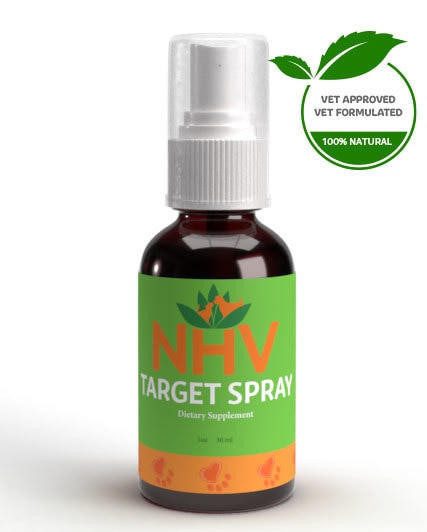
Target Spray for dogs
Target Spray for dogs
Holistic Tick & Flea Spray for Dogs
buy 2 and save $3
What is it?
This flea spray for dogs soothes bites as well as protects against future ones. Give your pet the best with a holistic flea and tick spray for your dog from NHV’s line of natural pet products.
How does it work?
- Deters fleas, ticks, lice, and mosquitoes
- Helps heal and soothe irritated skin
- Free of pyrethrins
- No unpleasant smell
Why trust it?
This flea spray for pets is made only from natural ingredients and has zero harmful pesticides.
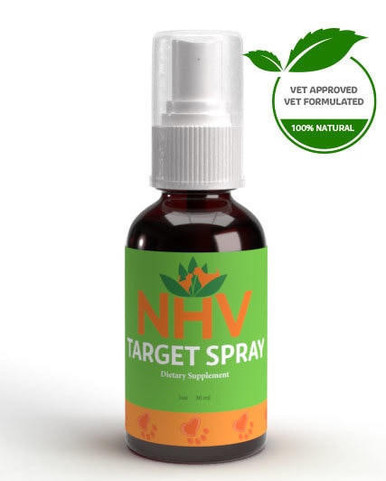
What is it?
This flea spray for dogs soothes bites as well as protects against future ones. Give your pet the best with a holistic flea and tick spray for your dog from NHV’s line of natural pet products.
How does it work?
- Deters fleas, ticks, lice, and mosquitoes
- Helps heal and soothe irritated skin
- Free of pyrethrins
- No unpleasant smell
Why trust it?
This flea spray for pets is made only from natural ingredients and has zero harmful pesticides.
Pest Deterrent and Protection for Dogs
Pest infestations in your dog can result in a lot more than irritated, itchy skin. Serious concerns like Lyme disease, anemia, intestinal parasites, and hair loss are just a few of the side effects your dog may experience if bitten by insects. Skipping proactive care like our flea spray for dogs does more than risk your pet’s health and comfort: it also risks yours. Prioritize pest prevention in your household today with Target Spray for dogs.
How NHV’s Flea and Tick Spray Supports Dogs With Pest Problems
Target Spray helps reduce the uncomfortable symptoms of a bug bite thanks to its naturally soothing antiseptic, anti-inflammatory, antioxidant, anti-fungal, and astringent properties. Target Spray also utilizes numerous herbs, essential oils, and other natural ingredients to deter pests and prevent future bites from occurring.
Keep Fleas and Ticks Away from Your Dog All Year
Give your pets the proactive care they need with NHV’s line of natural pet products. Avoid irritated skin, hair loss, and allergy flare-ups in your pet with flea and tick spray for dogs.
- item number
- PH2150d
- weight
- 0.7
- volume
- 1 fl. oz. (30ml)
- form
- liquid
- life stages
- adult, senior, puppy
- made in
- canada
Aloe Vera — Soothes skin and promotes healing of bug bites
Benzoin Gum — Contains antiseptic, expectorant, and astringent qualities
Celandine — Helps against microorganisms and can help reduce swelling and pain
Ceylon Citronella Oil — Contains antiviral and antibacterial qualities and helps deter pests
European Pennyroyal — A natural insect deterrent and helps alleviate itching
Lavender — Contains antiseptic and anti-inflammatory healing qualities and is a natural insect deterrent
Lemongrass Oil — Contains antibacterial, anti-inflammatory, and anti-fungal qualities and also acts as a natural insect and mite deterrent
Milk Thistle — Used topically helps soothe inflamed skin
Neem — Contains insect deterrent qualities and provides wound healing support
Rosemary — Is a natural insect deterrent and contains antiseptic, astringent, and anti-inflammatory qualities
Sweet Scented Marigold — Deter pests and contains astringent, anti-inflammatory, and pain-relieving properties
Tea Tree Oil — Contains antiseptic qualities and can help against microorganisms
How to Administer
Topical Spray: Spray several times a day as needed. It may sometimes be necessary to shave or trim your pet’s hair so that the Target spray reaches the affected area.
Caution
Do not spray near or into the eyes or nose. Do not use in pregnant animals.
-
Description
Pest Deterrent and Protection for Dogs
Pest infestations in your dog can result in a lot more than irritated, itchy skin. Serious concerns like Lyme disease, anemia, intestinal parasites, and hair loss are just a few of the side effects your dog may experience if bitten by insects. Skipping proactive care like our flea spray for dogs does more than risk your pet’s health and comfort: it also risks yours. Prioritize pest prevention in your household today with Target Spray for dogs.
How NHV’s Flea and Tick Spray Supports Dogs With Pest Problems
Target Spray helps reduce the uncomfortable symptoms of a bug bite thanks to its naturally soothing antiseptic, anti-inflammatory, antioxidant, anti-fungal, and astringent properties. Target Spray also utilizes numerous herbs, essential oils, and other natural ingredients to deter pests and prevent future bites from occurring.
Keep Fleas and Ticks Away from Your Dog All Year
Give your pets the proactive care they need with NHV’s line of natural pet products. Avoid irritated skin, hair loss, and allergy flare-ups in your pet with flea and tick spray for dogs.
- item number
- PH2150d
- weight
- 0.7
- volume
- 1 fl. oz. (30ml)
- form
- liquid
- life stages
- adult, senior, puppy
- made in
- canada
-
Ingredients
Aloe Vera — Soothes skin and promotes healing of bug bites
Benzoin Gum — Contains antiseptic, expectorant, and astringent qualities
Celandine — Helps against microorganisms and can help reduce swelling and pain
Ceylon Citronella Oil — Contains antiviral and antibacterial qualities and helps deter pests
European Pennyroyal — A natural insect deterrent and helps alleviate itching
Lavender — Contains antiseptic and anti-inflammatory healing qualities and is a natural insect deterrent
Lemongrass Oil — Contains antibacterial, anti-inflammatory, and anti-fungal qualities and also acts as a natural insect and mite deterrent
Milk Thistle — Used topically helps soothe inflamed skin
Neem — Contains insect deterrent qualities and provides wound healing support
Rosemary — Is a natural insect deterrent and contains antiseptic, astringent, and anti-inflammatory qualities
Sweet Scented Marigold — Deter pests and contains astringent, anti-inflammatory, and pain-relieving properties
Tea Tree Oil — Contains antiseptic qualities and can help against microorganisms
-
Dosage
How to Administer
Topical Spray: Spray several times a day as needed. It may sometimes be necessary to shave or trim your pet’s hair so that the Target spray reaches the affected area.Caution
Do not spray near or into the eyes or nose. Do not use in pregnant animals.
immune support
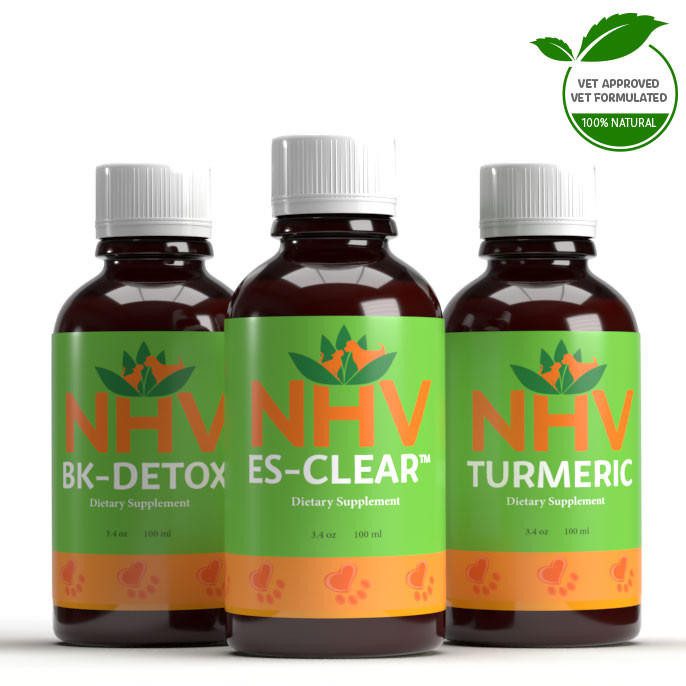
Immune System Support Gold
Immune System Support Gold
BK Detox, ES Clear & Turmeric
bundle and save with pet expert kits
3 month supply for a small to medium size pet
What is it?
NHV’s Immune System Support Gold is a natural supplement bundle formulated with herbal ingredients to help strengthen your pet’s immune system, flush out toxins, fight infections, and boost overall vitality with essential vitamins, minerals, and antioxidants.
How Does it Work?
- Blend of herbal ingredients to support healthy immune function
- May help flush toxins from the lymphatic system and vital organs
- Natural aid to combat bacterial and fungal infections
- Rich in vitamins, minerals and antioxidants to enhance immune response
Why Should I Trust It?
Vet-approved and vet-formulated natural remedies.

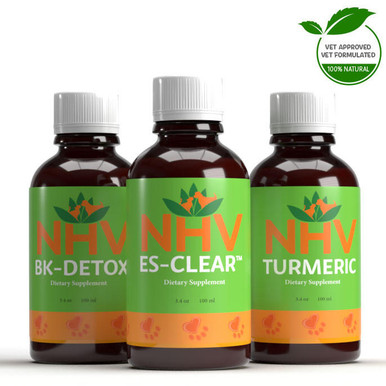
What is it?
NHV’s Immune System Support Gold is a natural supplement bundle formulated with herbal ingredients to help strengthen your pet’s immune system, flush out toxins, fight infections, and boost overall vitality with essential vitamins, minerals, and antioxidants.
How Does it Work?
- Blend of herbal ingredients to support healthy immune function
- May help flush toxins from the lymphatic system and vital organs
- Natural aid to combat bacterial and fungal infections
- Rich in vitamins, minerals and antioxidants to enhance immune response
Why Should I Trust It?
Vet-approved and vet-formulated natural remedies.

Whenever our pets get sick or something is off, it takes a toll on their immune system. Give your furkiddo a little extra support with NHV’s Immune System Support Gold to bolster their natural defenses.
What Does The Immune System do?
All living creatures are susceptible to harmful microorganisms invading their body and making them sick. Your cat or dog’s first line of defense is their skin - a physical barrier protecting them from the outside world. Beyond the skin, vertebrate animals (like humans and your pets) have also developed a complex system to target and fight off diseases called the immune system. So, in other words, the immune system is your furkiddo’s best defense against pathogens and infectious diseases. The main parts of the immune system are:
- White blood cells
- Antibodies
- The complement cascade
- The lymphatic system
- The spleen
- Bone marrow
- The thymus gland
Holistic Remedies for Canine and Feline Immune Support
From the moment they open their eyes, our furry friends want to explore, sniff and play. Sadly, many of our four-legged friends will experience some form of illness in their lifetime, which will weaken their immune system and make them susceptible to all sorts of other health complications. Our Immune System Support Gold can be used for proactive pet care as well as be helpful for more severe conditions, like a degenerative disease where their immune system may be severely weakened. NHV supplements are formulated to be used alongside conventional veterinary treatments as they contain many beneficial properties to support your pet's overall vitality as well as add extra support to help restore healthy immune function.
How NHV Remedies Help to Restore the Immune System
Any time your furkiddo's health is off track, their immune system is most likely affected. NHV's Immune Health Kit contains BK-Detox, ES-Clear, and Turmeric. BK-Detox helps flush the lymphatic system of toxic waste (especially areas of the body having scar tissue or swelling), support gentle detoxification of vital organs, and help to build new blood cells. Although NHV ES Clear is our leading degenerative disease support supplement, ingredients like Sheep's Sorrel and Slippery Elm are also highly beneficial for their nutritional qualities and for boosting white blood cell and T-cell production. Turmeric adds extra antioxidant support to enhance the body’s immune response and soothes inflammation.
BK Detox
- Supports healthy immune function
- May help flush toxins from your pet’s system
- May enhance white blood cell and T cell production
- Beneficial for fighting bacterial and fungal infections
ES Clear
- Blend of nutritious herbs is a good source of B vitamins, calcium, iron, and more
- May enhance white blood cell and T cell production
- Bolsters your pet’s immune system
- Natural aid to help flush toxins through the liver and lymphatic system
- High in free radicals scavengers (reduce cell damage)
- Beneficial aid to combat bacterial and fungal infections
Turmeric
- Rich source of antioxidants help to improve immune response
- Contains analgesic properties (may ease discomfort)
- Natural support for inflammation in the liver, kidneys, and other vital organs
- Turmeric and Black pepper are considered superfoods
Canine and Feline Immune Support the Natural Way
With NHV Supplements, you can help provide your furry friend with the extra support they need to restore their immune health and support other vital body processes. All of our care products are created with 100% organic and wildcrafted ingredients. If you have any questions about your pet’s unique health needs, Get in touch with an NHV Pet Expert - we’re always happy to help.
- item number
- BD5059
- weight
- 2.1
- volume
- 3 x 3.4 fl. oz (100ml)
- form
- liquid
- life stages
- adult, senior, puppy/kitten
- made in
- Canada
Made with the finest, organically grown, or ethically harvested herbs. Made specifically for pets, vet-formulated and vet approved.
BK-Detox
- Buckthorn has been used traditionally to cleanse blood and improve movement through the GI tract (to rid the body of waste and not trigger the immune system unnecessarily).
- Burdock is known to be a highly effective blood purifier rich in minerals such as calcium, phosphorus, iron, thiamine, and riboflavin that also support building new white blood cells.
- Chaparral contains antibacterial, antifungal, and antimicrobial properties to combat infection, add antioxidant support and help to cleanse the blood. It has strong affinities for the skin, blood, and liver.
- Cleavers have long been prized for its ability to increase flow through the lymphatic system (especially if there is scar tissue or swelling) and help improve skin ailments.
- Echinacea Angustifolia is an herb containing a range of immune-stimulating compounds which include polysaccharides, flavonoids, and essential oils. Polysaccharides increase the number of antibodies, increase white blood cell production and enhance healing.
- Gotu Kola has been used for over millennia to improve blood circulation and encourage the detoxification of vital organs and tissues.
- Neem is known to help cleanse the body and promote healing. It acts as an effective disinfectant agent for skin diseases and contains antimicrobial properties.
- Oregon Grape contains isoquinoline alkaloids, tannins, and resins which have demonstrated antibiotic and immunostimulatory properties.
- Prickly Ash is a beneficial astringent herb that helps to flush the entire lymphatic system and support the removal of metabolic wastes.
- Red Clover is a blood purifying herb with strong affinities to the liver, blood, and skin. It is also highly nutritive and may have anti-tumor properties.
- Sarsaparilla is an herb with diuretic and cleansing properties. It is known to help flush the kidneys of toxins and help with liver issues.
ES Clear
- Burdock is naturally rich in many beneficial minerals to support liver detoxification and help to cleanse and build blood.
- Chinese Rhubarb is a herb with astringent properties that encourages waste removal, helps to build and cleanse the blood as well as improves bile flow.
- Sheep’s Sorrel is an excellent source of immune-stimulating vitamins and minerals including vitamins C & D as well as beta-carotene which helps improve white blood cell and T-cell production. Vitamin D also helps maintain healthy bone marrow.
- Slippery Elm is a rich source of nutrients such as vitamins (A, B complex, C, K), minerals (calcium, magnesium and sodium) which are all beneficial for immune health, inflammation and producing new white blood cells.
Turmeric
- Black Pepper contains many vitamins and minerals to support building new white blood cells, reduce inflammation, and make the curcumin in Turmeric bioavailable for better absorption.
- Turmeric is highly nutritious and contains anti-inflammatory properties that are beneficial for enhancing the response of antibodies and lymphocytes as well as possibly lower the chances of tumor formation.
Pet's Weight Dosage
To be taken twice daily. All NHV supplements are designed to be used together, and can, therefore, be given at once for convenience.
Select your pet's weight to determine the correct dose.
To be taken twice daily. Determine your pet’s weight and then use the easy chart below to determine the correct dose. This is the minimum dosage.
Pet's Weight Dosage
0 - 15 lb = 0.5 ml
16 - 30 lb = 1.0 ml
31 - 45 lb = 1.5 ml
46 - 60 lb = 2.0 ml
61 - 75 lb = 2.5 ml
Over 75 lb = 3.0 ml
How to Administer
Shake well before use. The easiest method is to use the dropper provided and place the drops into your pet’s food or favorite treat. You can also use the dropper and squirt directly into the pet’s mouth. Some pets can be finicky, if this occurs consider hiding the drops in foods most pet’s love such as fish, chicken or yogurt or a favorite treat. If your pet only eats dry food then soak a few kibbles at feeding time.
For Best Results
Herbal dietary supplements are beneficial to the health and well-being of your pet and are safe for long-term use. Every pet responds to natural herbal supplements differently, therefore it is important to be consistent and administer the product daily. Supplements generally take two to four weeks to take effect, however this will vary from one animal to the next.
Product Storage
All NHV Natural Pet Products are pure herbal extracts and contain no artificial additives, preservatives or coloring. Shelf life after opening is 6 months and must be refrigerated after opening.
Cautions and Contraindications
Do not use in pregnant or nursing animals.
All information provided by NHV Natural Pet Products is for educational purposes only.
-
Description
Whenever our pets get sick or something is off, it takes a toll on their immune system. Give your furkiddo a little extra support with NHV’s Immune System Support Gold to bolster their natural defenses.
What Does The Immune System do?
All living creatures are susceptible to harmful microorganisms invading their body and making them sick. Your cat or dog’s first line of defense is their skin - a physical barrier protecting them from the outside world. Beyond the skin, vertebrate animals (like humans and your pets) have also developed a complex system to target and fight off diseases called the immune system. So, in other words, the immune system is your furkiddo’s best defense against pathogens and infectious diseases. The main parts of the immune system are:
- White blood cells
- Antibodies
- The complement cascade
- The lymphatic system
- The spleen
- Bone marrow
- The thymus gland
Holistic Remedies for Canine and Feline Immune Support
From the moment they open their eyes, our furry friends want to explore, sniff and play. Sadly, many of our four-legged friends will experience some form of illness in their lifetime, which will weaken their immune system and make them susceptible to all sorts of other health complications. Our Immune System Support Gold can be used for proactive pet care as well as be helpful for more severe conditions, like a degenerative disease where their immune system may be severely weakened. NHV supplements are formulated to be used alongside conventional veterinary treatments as they contain many beneficial properties to support your pet's overall vitality as well as add extra support to help restore healthy immune function.
How NHV Remedies Help to Restore the Immune System
Any time your furkiddo's health is off track, their immune system is most likely affected. NHV's Immune Health Kit contains BK-Detox, ES-Clear, and Turmeric. BK-Detox helps flush the lymphatic system of toxic waste (especially areas of the body having scar tissue or swelling), support gentle detoxification of vital organs, and help to build new blood cells. Although NHV ES Clear is our leading degenerative disease support supplement, ingredients like Sheep's Sorrel and Slippery Elm are also highly beneficial for their nutritional qualities and for boosting white blood cell and T-cell production. Turmeric adds extra antioxidant support to enhance the body’s immune response and soothes inflammation.
BK Detox
- Supports healthy immune function
- May help flush toxins from your pet’s system
- May enhance white blood cell and T cell production
- Beneficial for fighting bacterial and fungal infections
ES Clear
- Blend of nutritious herbs is a good source of B vitamins, calcium, iron, and more
- May enhance white blood cell and T cell production
- Bolsters your pet’s immune system
- Natural aid to help flush toxins through the liver and lymphatic system
- High in free radicals scavengers (reduce cell damage)
- Beneficial aid to combat bacterial and fungal infections
Turmeric
- Rich source of antioxidants help to improve immune response
- Contains analgesic properties (may ease discomfort)
- Natural support for inflammation in the liver, kidneys, and other vital organs
- Turmeric and Black pepper are considered superfoods
Canine and Feline Immune Support the Natural Way
With NHV Supplements, you can help provide your furry friend with the extra support they need to restore their immune health and support other vital body processes. All of our care products are created with 100% organic and wildcrafted ingredients. If you have any questions about your pet’s unique health needs, Get in touch with an NHV Pet Expert - we’re always happy to help.
- item number
- BD5059
- weight
- 2.1
- volume
- 3 x 3.4 fl. oz (100ml)
- form
- liquid
- life stages
- adult, senior, puppy/kitten
- made in
- Canada
-
Ingredients
Made with the finest, organically grown, or ethically harvested herbs. Made specifically for pets, vet-formulated and vet approved.
BK-Detox
- Buckthorn has been used traditionally to cleanse blood and improve movement through the GI tract (to rid the body of waste and not trigger the immune system unnecessarily).
- Burdock is known to be a highly effective blood purifier rich in minerals such as calcium, phosphorus, iron, thiamine, and riboflavin that also support building new white blood cells.
- Chaparral contains antibacterial, antifungal, and antimicrobial properties to combat infection, add antioxidant support and help to cleanse the blood. It has strong affinities for the skin, blood, and liver.
- Cleavers have long been prized for its ability to increase flow through the lymphatic system (especially if there is scar tissue or swelling) and help improve skin ailments.
- Echinacea Angustifolia is an herb containing a range of immune-stimulating compounds which include polysaccharides, flavonoids, and essential oils. Polysaccharides increase the number of antibodies, increase white blood cell production and enhance healing.
- Gotu Kola has been used for over millennia to improve blood circulation and encourage the detoxification of vital organs and tissues.
- Neem is known to help cleanse the body and promote healing. It acts as an effective disinfectant agent for skin diseases and contains antimicrobial properties.
- Oregon Grape contains isoquinoline alkaloids, tannins, and resins which have demonstrated antibiotic and immunostimulatory properties.
- Prickly Ash is a beneficial astringent herb that helps to flush the entire lymphatic system and support the removal of metabolic wastes.
- Red Clover is a blood purifying herb with strong affinities to the liver, blood, and skin. It is also highly nutritive and may have anti-tumor properties.
- Sarsaparilla is an herb with diuretic and cleansing properties. It is known to help flush the kidneys of toxins and help with liver issues.
ES Clear
- Burdock is naturally rich in many beneficial minerals to support liver detoxification and help to cleanse and build blood.
- Chinese Rhubarb is a herb with astringent properties that encourages waste removal, helps to build and cleanse the blood as well as improves bile flow.
- Sheep’s Sorrel is an excellent source of immune-stimulating vitamins and minerals including vitamins C & D as well as beta-carotene which helps improve white blood cell and T-cell production. Vitamin D also helps maintain healthy bone marrow.
- Slippery Elm is a rich source of nutrients such as vitamins (A, B complex, C, K), minerals (calcium, magnesium and sodium) which are all beneficial for immune health, inflammation and producing new white blood cells.
Turmeric
- Black Pepper contains many vitamins and minerals to support building new white blood cells, reduce inflammation, and make the curcumin in Turmeric bioavailable for better absorption.
- Turmeric is highly nutritious and contains anti-inflammatory properties that are beneficial for enhancing the response of antibodies and lymphocytes as well as possibly lower the chances of tumor formation.
-
Dosage
Pet's Weight Dosage
To be taken twice daily. All NHV supplements are designed to be used together, and can, therefore, be given at once for convenience.
Select your pet's weight to determine the correct dose.
To be taken twice daily. Determine your pet’s weight and then use the easy chart below to determine the correct dose. This is the minimum dosage.
Pet's Weight Dosage
0 - 15 lb = 0.5 ml
16 - 30 lb = 1.0 ml
31 - 45 lb = 1.5 ml
46 - 60 lb = 2.0 ml
61 - 75 lb = 2.5 ml
Over 75 lb = 3.0 ml
How to Administer
Shake well before use. The easiest method is to use the dropper provided and place the drops into your pet’s food or favorite treat. You can also use the dropper and squirt directly into the pet’s mouth. Some pets can be finicky, if this occurs consider hiding the drops in foods most pet’s love such as fish, chicken or yogurt or a favorite treat. If your pet only eats dry food then soak a few kibbles at feeding time.For Best Results
Herbal dietary supplements are beneficial to the health and well-being of your pet and are safe for long-term use. Every pet responds to natural herbal supplements differently, therefore it is important to be consistent and administer the product daily. Supplements generally take two to four weeks to take effect, however this will vary from one animal to the next.Product Storage
All NHV Natural Pet Products are pure herbal extracts and contain no artificial additives, preservatives or coloring. Shelf life after opening is 6 months and must be refrigerated after opening.Cautions and Contraindications
Do not use in pregnant or nursing animals.All information provided by NHV Natural Pet Products is for educational purposes only.
Published: June 17, 2025

 USD
USD
 Canadian Dollars
Canadian Dollars





